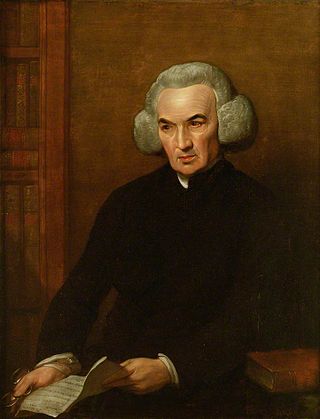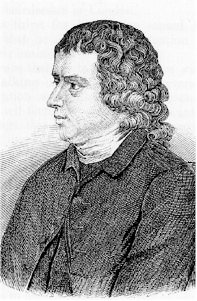
Richard Price was a Welsh moral philosopher, Nonconformist minister and mathematician. He was also a political reformer, pamphleteer, active in radical, republican, and liberal causes such as the French and American Revolutions. He was well-connected and fostered communication between many people, including Thomas Jefferson, John Adams, George Washington, Mirabeau and the Marquis de Condorcet. According to the historian John Davies, Price was "the greatest Welsh thinker of all time".
Isaac Maddox was an Anglican clergyman, successively bishop of St Asaph and of Worcester.

Robert Robinson was an English Dissenter, influential Baptist and scholar who made a lifelong study of the antiquity and history of Christian Baptism. He was also author of the hymns "Come Thou Fount of Every Blessing" and "Mighty God, while angels bless Thee", the former of which he wrote at age 22 after converting to Methodism. The latter was later set to music by Dr John Randall, Music Professor at Cambridge University.
William Josiah Irons (1812–1883) was a priest in the Church of England and a theological writer.

Samuel Bradford was an English churchman and whig, bishop successively of Carlisle and Rochester.

Samuel Hallifax or Halifax (1733–1790) was an English churchman and academic, holder of several chairs at Cambridge and was successively Bishop of Gloucester (1781–1789) and Bishop of St Asaph (1789–1790).
Ralph Churton was an English churchman and academic, archdeacon of St David's and a biographer.
John Law (1745–1810) was an English mathematician and clergyman who began his career as a Fellow of Christ's College, Cambridge, and went on to become chaplain to the Lord Lieutenant of Ireland and Church of Ireland bishop of Clonfert and Kilmacduagh (1782–1787), Killala and Achonry (1787–1795), and finally of Elphin (1795–1810).
Thomas Amory D.D. was a British dissenting tutor and minister and poet from Taunton.

Thomas Elrington was an Irish academic and bishop. He was Donegall Lecturer in Mathematics (1790-1795) at Trinity College Dublin (TCD). While at TCD he also served as Erasmus Smith's Professor of Mathematics (1795–1799) and as Erasmus Smith's Professor of Natural and Experimental Philosophy (1799–1807). Later, he was Provost of Trinity College Dublin (1811-1820), then Bishop of Limerick, Ardfert and Aghadoe (1820-1822), and finally Bishop of Ferns and Leighlin till his death in Liverpool in 1835.
Samuel Badcock (1747–1788) was an English nonconformist minister, theological writer and literary critic.
Thomas Francklin was an English academic, clergyman, writer and dramatist

Thomas Fothergill D.D. (1715/6–1796) was an English cleric and academic administrator at the University of Oxford.

John Eyre was an English evangelical clergyman. He helped in establishing some of the major national evangelical institutions.
Pupils of Westminster School and Charterhouse School played a cricket match in London on 5 August 1794 which was recorded in the earliest known scorecard of a schools match.
Geraldine Emma May Jebb CBE, known as Gem Jebb, was the daughter of Heneage Horsley Jebb and Geraldine Croker Russell. The Jebbs were a distinguished Irish family, prominent in both the Church of Ireland and the legal profession: her paternal grandparents were Robert Jebb QC and Harriet Horsley, a descendant of Bishop Samuel Horsley. Her mother was a daughter of John Russell, Archdeacon of Clogher and his wife Frances Story. She was the Principal of Bedford College, University of London, from 1930 to 1951, the first higher education women's college in the United Kingdom. She was unmarried.
Heneage Horsley was Dean of Brechin from 1812 until his death.

Thomas Wadsworth (1630–1676) was an English presbyterian minister, an ejected nonconformist after 1662.
John Abraham Russell was an Irish Anglican priest.









